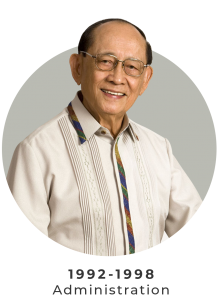
Fidel Valdez Ramos
LIST OF OFFICIALS
Honorary Adviser: Sen. Leticia R. Shahani
Chairperson: Imelda M. Nicolas
Executive Director: Remedios I. Rikken (1992-1994)
Teresita S. Castillo
(1994-1998)
Government Organization Commissioners
Sec. Salvador Escudero, DA
Sec. Emilia Boncodin, DBM
Sec. Erlinda Peflanco, DECS
Sec. Domingo Siazon, DFA
Sec. Epimaco Velasco, DILG
Sec. Carmencita Trajano, DOLE
Sec. Lina Laigo, DSWD
Sec. Cesar Bautista, DTI
Sec. Cielito Habito, NEDA
Designated Representatives
Assec. Marinela Castillo, DA
Assec. Narcisa Santos, DBM
Dir. Fe Hidalgo, DECS
Usec. Rosario Manalo/Dir. Eva Betita, DFA
Assec. Yolanda de Leon, DILG
Dr. Rebecca Ramos, DOH
Assec. Carmela Torres, DOLE
Usec. Belinda Manahan, DWSD
Usec. Ernesto Ordoñez, DTI
Dir. Erlinda Capones, NEDA
Non-Government Organization Commissioners
Angelita F. Ago
Amina R. Bernardo
Rina J. David
Aurora J. de Dios
Trinidad M. Domingo
Myrna S. Feliciano
Patricia B. Licuanan
Jenny R. Llaguno
Fe B. Mangahas
Lourdes V. Mastura
Priscilla E. Ong
Leonora Protacio
Nona S. Ricafort
Nancy Q. Sison
Mary Grace A. Tirona
1992
SIGNIFICANT EVENTS
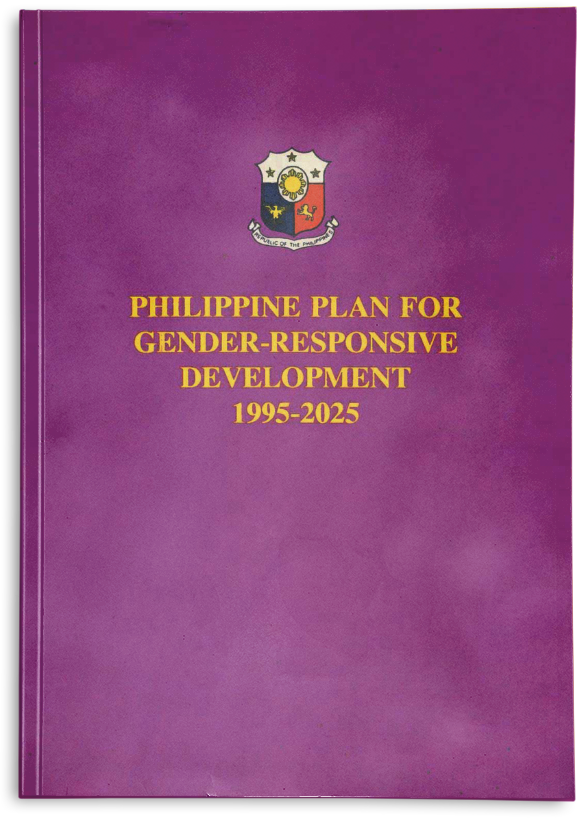
Adoption of the Philippine Plan for Gender-Responsive Government, a 30-year perspective plan that outlines the policies, strategies, programs and projects that the government must adopt to enable women to participate in and benefit from national development.1
Republic Act 7192 which instituted what we now call as the gender mainstreaming strategy into our national laws was enacted. This landmark legislation was co-authored by Senators Santanina Tillah-Rasul and Raul Roco. It mandated the National Economic and Development Authority, with the assistance of the NCRFW (now PCW) to ensure that the different government departments, including its agencies and instrumentalities assess existing and formulate programs, activities, and projects that address women’s concerns, with the active participation of women and women’s organizations. The law likewise paved the way for women’s admission, training, graduation, and commissioning in all military or similar schools of the Armed Forces of the Philippines and the Philippine National Police.
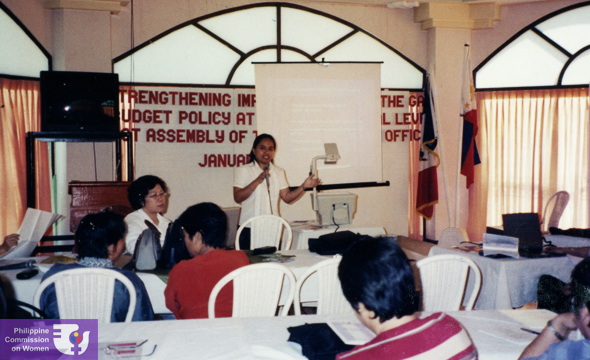
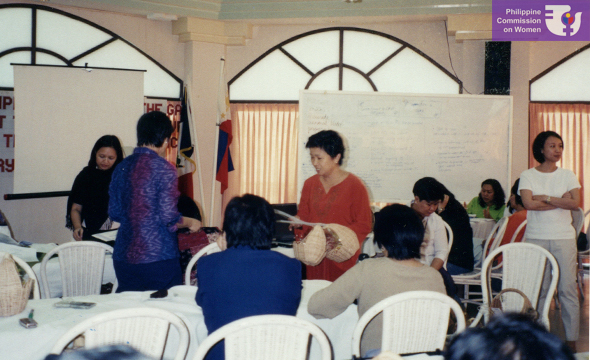
There was a scarce representation of women in the Cabinet, but President Fidel V. Ramos proved as a staunch ally of the Commission. Hence, he issued several Executive Orders that sought to deepen the bases and broaden the scope of gender mainstreaming. He increased the frequency of presidential meetings with NCRFW from twice a year to quarterly.2
LEGISLATIVE VICTORIES
RA 7192: Women in Development and Nation Building Act provided the legal basis for equal opportunities for women and men.
RA 7192 provided the legal basis for equal opportunity for women and men in political and civic life. It was specifically mandated to formulate the Philippine Plan for Gender-Responsive Development (1995-2025).3
RA 7322: Act increasing maternity benefits in favor of women workers in the private sector.
RA 7600: Rooming-in and Breast-Feeding Act that provides incentives to all government and private health institutions with rooming-in and breastfeeding practices
1993
LEGISLATIVE VICTORY
RA 7655: Increases the minimum wage for domestic workers
1994
SIGNIFICANT EVENT
The NCRFW and the Development Academy of the Philippines held a forum on gender and development to establish a network of GAD experts and facilitators. Eighty participants represented the academe, women NGOs, national line agencies, LGUs, consultancy groups, etc. 4
LEGISLATIVE VICTORIES
RA 7688: An Act giving representation to women in the Social Security Commission
Executive Order No. 208, s. 1994: Further Defining the Composition, Powers and Functions of the NCRFW
1995
SIGNIFICANT EVENTS
To meet the growing demands on its services, the NCRFW’s composition was further defined by issuing Executive Order No. 268, designating ten Department Secretaries as Ex-Officio Board Members of the Commission and twelve private sector representatives. 5
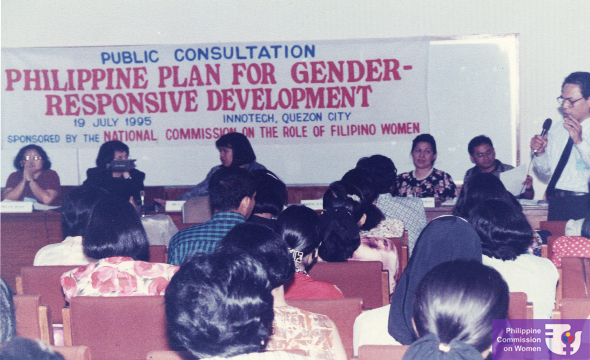
Under Executive Order No. 273, s. 1995, the Philippine Plan for Gender-Responsive Development was adopted as the country’s primary vehicle for implementing the 1995 Beijing Platform for Action (BPfA), which was espoused at the 1995 UN 4th World Conference on Women. 6
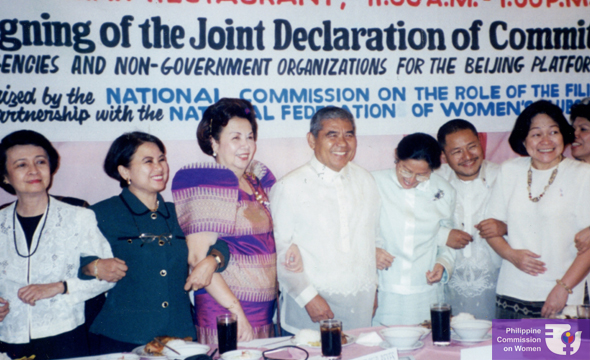
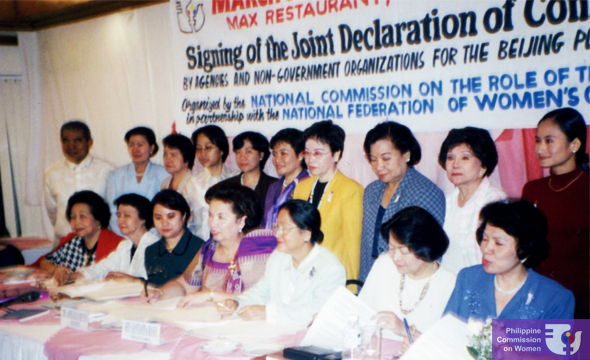
The BPfA was the resulting document of said Conference held in Beijing, China, wherein the governments and the United Nations agreed to promote gender mainstreaming as a strategy to ensure that a gender perspective is reflected in all policies and programmes at the national, regional, and international levels. It represents the international community’s towards the promotion of women’s welfare.7
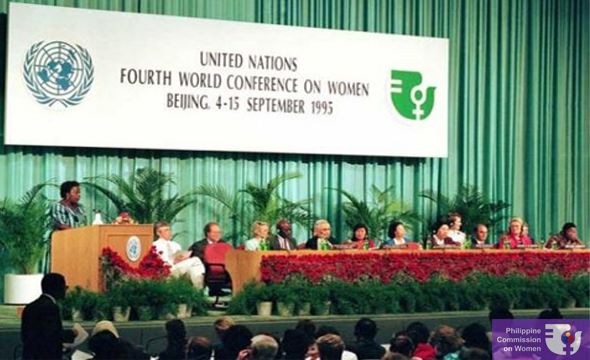
Senator Leticia Ramos Shahani introduced the mandatory five percent (5%) allocation for gender and development known as the GAD budget of every government department and agency.8 Since then, the GAD budget allocation has been included in the annual General Appropriations Act.
LEGISLATIVE VICTORIES
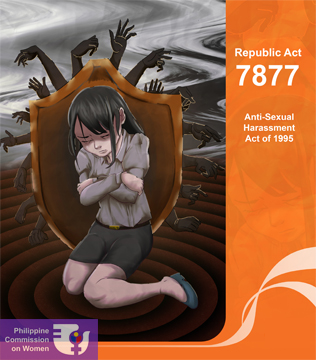
RA 7877: The Anti-Sexual Harassment Act of 1995 declared all forms of sexual harassment in the employment environment as well as in the education and training environment as unlawful
RA 7882: Provision of Assistance to Women Engaging in Micro and Cottage Business Enterprises and for Other Purposes
RA 7941: Party-list System Act; provided women as one of the sectors who could form sectoral parties
Executive Order 273: Approval and Adoption of the Philippine Plan for Gender-Responsive Development 1995-2025
Executive Order No. 268, s. 1995: Amending the EO No. 208, s. 1995 entitled “Further Defining the Composition, Powers, and Functions of the NCRFW”
1996
SIGNIFICANT EVENT
Through the Canadian International Development Agency (CIDA) support, the NCRFW implemented the Phase II of the Institutional Strengthening Project to develop skills, tools, and systems toward sustainable actions on gender equality. This resulted in policy imperatives addressing gender issues and concerns, development planning for women, setting up GAD institutional mechanisms, GAD focal systems, GAD training for national agencies and offices, GAD database and gender statistics, and strengthening partnerships with women NGOs.9
The NCRFW, together with a team of consultants, began the development of the Gender Mainstreaming Evaluation Framework (GMEF) to address the need for a tool to measure the extent of gender mainstreaming efforts of organizations.10
LEGISLATIVE VICTORIES
RA 8042: Migrant Workers and Overseas Filipinos Act of 1995; provided gender-responsive programs for overseas Filipino workers
RA 8187: Paternity Leave Act; called upon government officials to act on domestic violence, granted paternity leave
1997
LEGISLATIVE VICTORIES
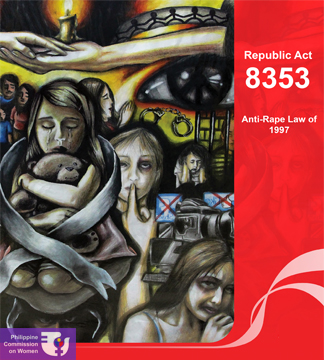
RA 8353: Anti-Rape Law of 1997 broadened the definition of rape which may be committed by having carnal knowledge of a woman under certain circumstances or by committing acts of sexual assault
RA 8369: Family Courts Act of 1997
Proclamation 1105: National Rural Women’s Day
NO SPECIFIC YEAR
SIGNIFICANT EVENT
Piloted a hospital-based crisis center that offered treatment, counseling, and temporary shelter for women victims of violence.
Cited Sources:
1 Philippine Commission on Women. PCW 40th Anniversary video. (2015). Retrieved here on June 2019.
2 Honculada, J. and Ofreneo, R. (2018.) The National Commission on the Role of Filipino Women, the women’s movement and gender mainstreaming in the Philippines. Retrieved here on June 2019.
3 Alporha, Veronica, Evangelista, Meggan and Hega, Mylene. (2017). “Feminism and the Women’s Movement in the Philippines.” Friedrich Ebert Stiftung. Retrieved here on June 2019.
4 Focal Point News. Volume III. No. 4. NCRFW. (December 1994).
5 Executive Order No. 268. (1995). Retrieved here on July 2019.
6 Philippine Commission on Women. PCW 40th Anniversary video. (2015). Retrieved here on June 2019.
7 Philippine Commission on Women. N.d. “Beijing Platform for Action.” Retrieved here on July 2019.
8 Alporha, Veronica, Evangelista, Meggan and Hega, Mylene. (2017). “Feminism and the Women’s Movement in the Philippines.” Friedrich Ebert Stiftung. Retrieved here on June 2019.
9 NCRFW. (2001). Making Government Work for Women’s Empowerment and Gender Equality. Retrieved here.
10 A Handbook on the Application of the Enhanced Gender Mainstreaming Evaluation Framework. (2016). Manila: Philippine Commission on Women.

